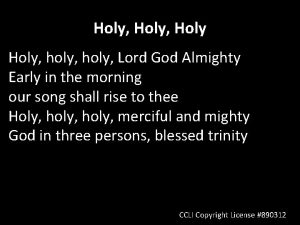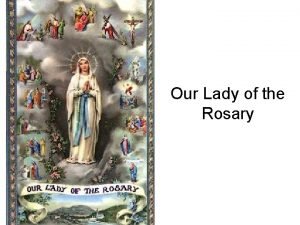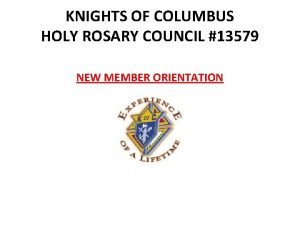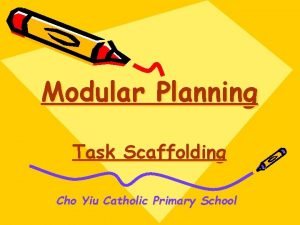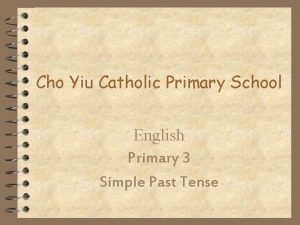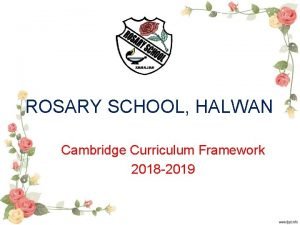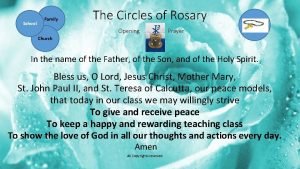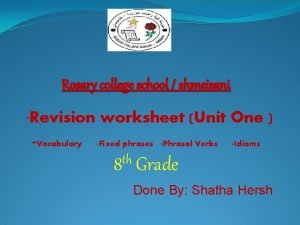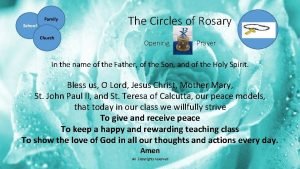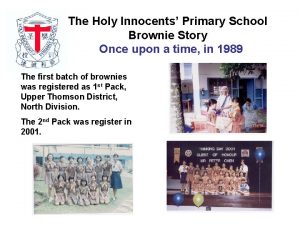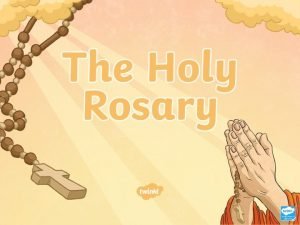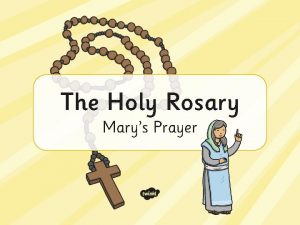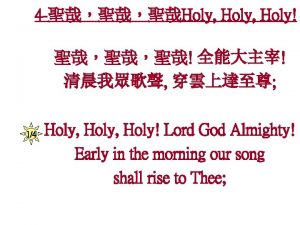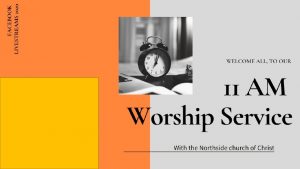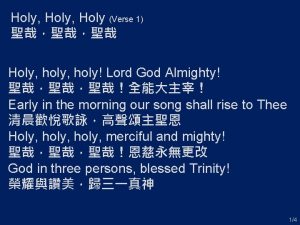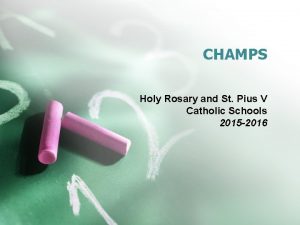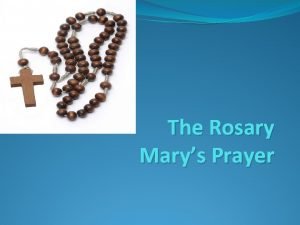HOLY ROSARY CATHOLIC PRIMARY SCHOOL Welcome to Year

















- Slides: 17

HOLY ROSARY CATHOLIC PRIMARY SCHOOL Welcome to Year One

Year One Staff • Miss Mc. Carthy– Infant 3 class teacher • • Mrs Hulme- Infant 4 class teacher Mrs Boden – Year 1 teaching assistant Mrs Roach – Year 1 teaching assistant Mrs Fairclough - Year 1 teaching assistant

General Class Information • Attendance: The classroom doors close at 9: 00 am prompt. Anybody • • arriving after this time must go through the office and will be marked late. Playtime: 10: 30 – 10: 45 and 2: 00 – 2: 15 Lunchtime: 11. 45; children have time to eat their lunch and then go out to play. Snack: Children have fruit provided for them at morning playtime. Water: Children can bring in a water bottle each day or can use the water fountains in school. Open door Policy: Communication between teachers and parents is important, please if you have anything you wish to talk about with your child's class teacher please wait to see them at the end of the day or make an appointment at the school office. Marking; Due to the age of the children detailed marking in Year 1 is not always appropriate. Therefore motivational comments and verbal feedback are more frequently used. Detailed marking is used only when a teacher has worked with that particular group when the marking can be meaningful. Keeping you informed: Each infant class will display any current information in the classroom windows for your reference.

A Typical Day in Year One Your child will experience the following activities in a typical day in year one. • Independent play • Reading with an adult • Whole class carpet time • Group work • Out door activities • Phonics – Letters and Sounds • Practical activities

Curriculum • When possible we follow a topic based • • • approach to learning in Year 1. Trips and visitors: We aim to enhance all topics with a range of experiences. Keeping you informed: We will regularly keep you updated on our latest topics and any relevant information. Our planned topics will be on the school website.

Reading • Reading in School: Children will read with an • • adult at least once a week in year 1. Some of these will be individual reading and some will be in a group guided/ shared reading session. We also read a variety of texts and stories within Literacy, Topic and Letters and Sounds lessons. Levels: Please remember that children learn to read at different rates and that reading is not a competition. Understanding the text and developing comprehension skills is equally as important as decoding words. Therefore children will not be rushed through levels.

Reading at home • Communication with parents: Your child’s individual reading record • • • will be stamped or a written comment made to indicate when a child has read at school. Specific adult comments will also be added when required. Their reading books are changed regularly during the week. Children must be responsible for putting their own book in the box to get changed. Home reading: In order for children to become fluent readers they must be given ample opportunity to practice the skills that they learn in school. We would ask that your read at least three times a week. Please ensure that this is quality time to share a book together. They will have the opportunity to change their book a number of times during the week. If it is noted that anyone is not reading at home they will be sent a letter home as a reminder. We expect that the children should repeat each book a number of times to ensure they are fluent and confident. You may feel that they are reading the text from memory – this is exactly what we want!!

Flash Cards • As in Reception your child will continue with their box • • of flash cards. This is a great way to develop the speed and fluency of their reading. We ask that it is your responsibility to tell your child’s class teacher when you think they are ready for more cards as there will be less time in class this year for us to practise in school. When you practise your child’s flash cards please record this in their yellow reading record. You must aim to practice their flash cards at least once a week. Please keep their box of flash cards in their book bag at all times.

Spelling • Children will have weekly spellings to learn. • Children will be assessed in school to find out the phonics phase they are currently working in. Their spellings will correspond to this. • Children will be tested on a Friday. • Children will be given a spelling book in which their weekly spellings will be pasted and they are encouraged to use one page to practise each week. • A good way to practise spellings is to; Look, Say, Cover, Write and Check. • Their spelling test will be done in school and marked the same day. Their marks are recorded in class and their tests are sent home for you to see. • Children must bring their spelling book folder into school every …

Maths • Early number skills are essential for all areas of maths and should be practiced regularly at home. • Please encourage your child to count daily. They should be able to count to 100 forwards and backwards, starting at any given numbers. • Once secure move onto counting in 2 s, 5 s and 10 s. They should be able to recognise odd and even numbers and recall these. • Children should know by heart halves and doubles to 10. • Number bonds are also very important and should be practiced at home. • As the year progresses children will learn about place value and how to partition numbers. • It will be beneficial if you start practising to tell the time with your child. • After Christmas your child will receive weekly maths homework.

Maths Packs • Will be given out after the maths • • Parents meeting. (Date to be confirmed) Your child is to keep their pack for year 1 and year 2. It must be returned at the end of year 2 or there is a small fee.

Letters and Sounds • Children will have daily phonics lessons. • In the summer term children will have a • phonics check. This consists of 40 words, 20 real words and 20 nonsense words. Nearer the time you may receive phonics activities to complete with your child for practice and consolidation.

RE • In Holy Rosary we follow the ‘Come and • • See’ curriculum for RE. Children will study a range of topics based around the church calendar. When necessary your child will bring home work to discuss with you at home. Children will be asked to reflect on what they have learnt and sometimes prepare work at home.

PE • Children will have PE twice a week. One will be • • • an indoor PE Lesson on either Dance or Gymnastics. The other will be an outdoor Games or Athletics Lesson. Children should have their PE kit in school at all times. They may bring it home every half term to get washed. PE Kit: White T-shirt, Blue or Black Shorts/ PE Skirt, Black Pumps Winter: Children may bring a black/ navy tracksuit to wear.

Homework • Reading books: Must be in school every • • day Spellings: Once a week with a weekly test Flash cards: practise at least once a week Maths activity: Weekly after Christmas Research for current topic: As and when required.

Medical • If your child requires inhalers or medication (prescription only) these must be brought to the office clearly labelled. A parent/ guardian must give clear instructions and sign.

Thank You School Website www. holyrosaryschool. co. uk If you have any questions please feel free to stay behind to ask.
 Mchr school
Mchr school Glory glory oh god almighty
Glory glory oh god almighty Holy are you lord holy is your name
Holy are you lord holy is your name 4th joyful mystery images
4th joyful mystery images Knights of the holy rosary
Knights of the holy rosary Sekeepare
Sekeepare Maßshirts
Maßshirts Cho yiu catholic primary school
Cho yiu catholic primary school Cho yiu catholic primary school
Cho yiu catholic primary school Rosary school halwan
Rosary school halwan Opening prayer for the rosary
Opening prayer for the rosary Rosary school shmeisani
Rosary school shmeisani Rosary school jabal amman
Rosary school jabal amman Holy innocent primary school
Holy innocent primary school Welcome to your senior year of high school
Welcome to your senior year of high school Holy family davidsonville
Holy family davidsonville Lindsey underhill
Lindsey underhill What are the 7 holy spirit gifts
What are the 7 holy spirit gifts

